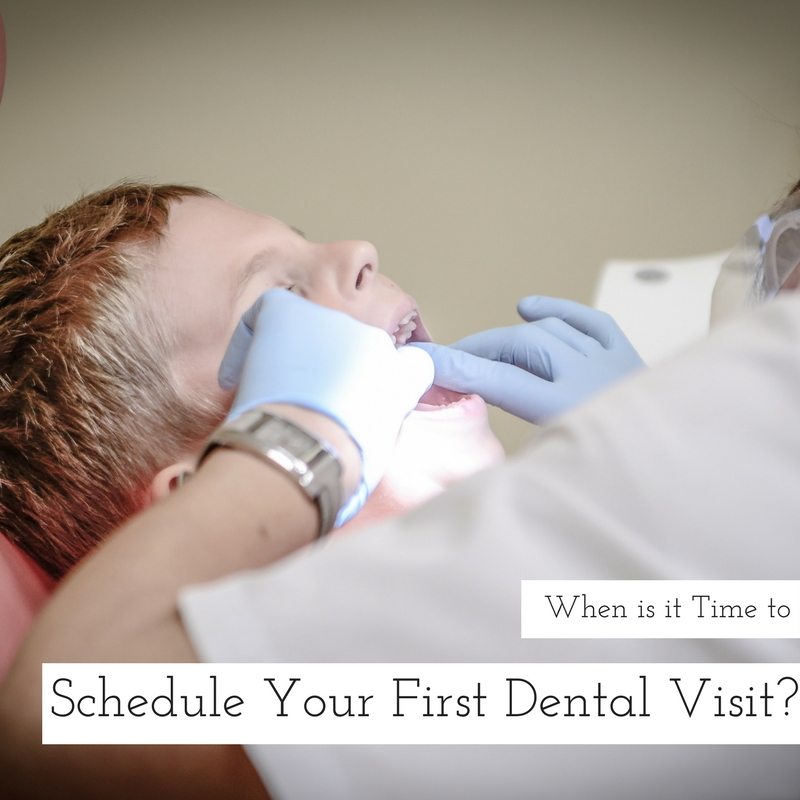It can be confusing to determine when you should take your baby for that first dental visit.

According to the American Academy of Pediatric Dentistry, infants should have their first dental visit by their first birthday. Pediatricians also recommend this one-year timeframe. The American Academy of Pediatrics advises that very young children who are at risk for cavities should see a pediatric dentist for the first visit by their first birthday.
Many new parents are surprised at the idea that dental visits should start so early. However, national research indicates that preschool children are developing an increasing number of cavities, according to national studies. In fact, more than 25% of US American children develop one or more cavities by age four. And, many children experience cavities before age two.
Benefits to Your Child from Prompt Dental Care
In order to prevent cavities during early childhood, it is essential to have a professional determination of your child’s cavity risk level. And, you need to be informed on how to care for your baby’s or toddler’s dental hygiene, use of fluoride, and any dietary issues that can impact your child’s dental health. Other information you need to obtain from your child’s dentist includes the following.
- How to use products with fluoride in childhood dental care
- Common dietary impacts on children’s oral health
- How to prevent accidents that can damage your child’s teeth
- Issues of thumb sucking and other oral habits
- Managing teething
- Stages of children’s dental development
Preparing for Your Child’s First Visit to the Dentist
Many parents are concerned that their children will be fussy during dental visits. But, very often they are surprised at how content infants are during the dentist’s examination. They often seem to enjoy all of the attention and are fascinated and curiously processing the unique event.
Consider asking another adult to attend the visit with you, ideally one who helps in caring for your child. Having a little support in managing your child during the visit can free you to talk more comfortably with the dentist and dental staff. For the same reason, it’s recommended not to bring your other children with you to the first visit.
Bring along extra diapers. And, bring a toy, blanket, or another favorite item, and favorite snacks for your child. These familiar things can help your child experience the dentist’s office as a safe and comfortable place.
Ask your pediatric dental staff to help you save time during the office visit by emailing you all necessary forms, so you can fill them out in advance. That way, you can take your time in listing all of your questions and concerns that you want to make sure you discuss with the dentist during the office visit.
What to Expect at Your Child’s First Dental Visit
The dentist and you, together, will perform a thorough examination of your child’s teeth and mouth. You will also be shown how to properly clean your child’s new teeth. The dentist will guide you through a little practice of that new routine. You should expect the following during the pediatric dental appointment.
- Review your child’s and your family’s dental history
- Discuss your child’s current oral health condition
- Discuss your child’s Bite (what to expect in the way your child’s teeth will grow)
- Teeth cleaning by the dentist or hygienist (especially if your child’s teeth have any staining)
- Fluoride application (especially if your child is at high risk for early childhood cavities.
- Instructions for your child’s dental hygiene, including using toothpaste and fluoride treatments.
- Explanation of connections between diet and your child’s dental health
- Check of cheeks, gums, and other soft tissue
- Explanation of what to expect as your child’s teeth continue to develop
- Recommended schedule for following up with future dental visits
- To have all of your questions answered and your concerns addressed
What You Should Ask the Dentist about Your Child’s Dental Care
Take this checklist with you to your child’s first dental visit, to help you remember to ask your pediatric dentist for the following important information.
- How your child’s dental development is progressing
- What your responsibilities are for early childhood dental care and monitoring
- When you should follow up with future dental visits for your child
- What your child’s risk appears to be for cavities, bite problems, or other dental issues
Follow-up Dental Visits for Your Child
Your pediatric dentist will recommend a follow-up visit schedule. Currently, instead of routine visits every six months, the dentist may base the schedule for follow-up care on an evaluation of your child’s individual risks and needs to best ensure prevention of potential oral problems.
For additional information about children’s dental care, or to make an appointment for your child, contact us today!



